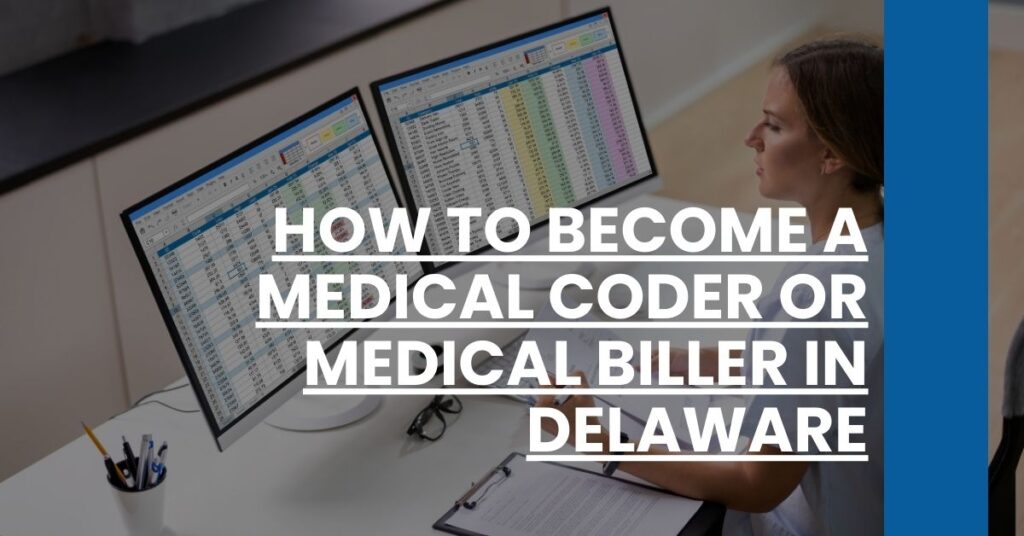Looking for schools in a specific city? Check out our lists of CPC in Wilmington.
Understanding Medical Coding and Billing
Medical coding and billing are crucial administrative functions within the healthcare industry. To become a skilled medical coder or biller, you must understand the roles and responsibilities associated with each position.
What Does a Medical Coder Do?
Medical coders are responsible for translating healthcare services, diagnoses, and equipment into standardized codes. These codes come from classification systems such as:
- ICD-10: Used for coding diseases and health conditions.
- CPT: Used for documenting medical, surgical, and diagnostic procedures.
- HCPCS: Used for coding various health services, equipment, and supplies.
Accurate medical coding is essential for maintaining patient records and processing insurance claims. This role demands a precise understanding of medical terminology, anatomy, and coding guidelines.
What Does a Medical Biller Do?
Medical billers handle the financial aspects of healthcare services. They use the codes provided by medical coders to prepare and submit claims to insurance companies. Their responsibilities include:
- Preparing claims: Ensuring all services are coded correctly before submission.
- Following up on claims: Managing denied or delayed claims to ensure prompt payment.
- Patient billing: Handling patient inquiries about billing issues, processing payments, and managing payment plans.
Billers must be well-versed in insurance policies and possess strong organizational and communication skills.
Skills Required for Medical Coding and Billing
Both roles require a distinct set of skills to succeed. As you consider how to become a medical coder or medical biller in Delaware, focus on developing:
- Attention to Detail: Accuracy is critical to ensure proper billing and coding.
- Analytical Skills: Abilities to analyze and interpret medical records and insurance policies.
- Communication: Clear and effective interaction with healthcare providers, insurance companies, and patients.
- Technical Proficiency: Familiarity with Electronic Health Records (EHR) and coding software.
Education Requirements
To become a medical coder or biller in Delaware, you’ll need appropriate educational credentials. Follow these guidelines to prepare for your role.
Basic Educational Prerequisites
The minimum educational requirement is a high school diploma or GED. However, many professionals choose to pursue additional education, such as:
- Associate Degree in Health Information Management: These programs usually take two years and cover broader healthcare administration topics.
- Certificate Programs: Focused on coding and billing, these programs can often be completed in less than a year and are ideal for those seeking quicker entry into the field.
Key Coursework to Focus On
When choosing a program, ensure it includes comprehensive training in areas such as:
- Medical Terminology: Understanding the language used by healthcare professionals.
- Anatomy and Physiology: Knowledge of the human body and its systems.
- Healthcare Compliance: Familiarity with laws and regulations affecting medical coding and billing.
Medical billing and coding programs also provide training on industry-standard coding systems (ICD-10, CPT, HCPCS) and electronic health records (EHR).
Importance of Accreditation
Selecting an accredited program is crucial for ensuring quality education. Accreditation by bodies like the Commission on Accreditation for Health Informatics and Information Management Education (CAHIIM) guarantees the program meets industry standards. This can significantly enhance your career prospects.
Choosing the Right Program in Delaware
Choosing the right program is a critical step in how to become a medical coder or medical biller in Delaware. Here’s what to consider:
Accredited Institutions
Ensure the program is accredited by a recognized body like CAHIIM. Delaware Technical Community College and Wilmington University are reputable institutions offering quality coding and billing programs.
Factors to Evaluate
When selecting a program, evaluate aspects such as:
- Tuition Costs: Compare tuition and whether the institution offers financial aid, scholarships, or grants.
- Program Duration: Consider whether the program aligns with your timeline for entering the field.
- Course Content: Ensure the curriculum includes both theoretical knowledge and practical training.
Hands-On Training
Practical experience through lab work or internships is invaluable. Look for programs that offer opportunities for gaining real-world experience. This prepares you to tackle job responsibilities confidently once you graduate.
Looking for Medical Coder or Medical Biller Information On States Bordering Delaware?
In addition to Delaware, we suggest looking for schools in nearby states.
- How to Become A Medical Coder or Medical Biller in Maryland
- How to Become A Medical Coder or Medical Biller in Pennsylvania
- How to Become A Medical Coder or Medical Biller in New Jersey
- How to Become A Medical Coder or Medical Biller in Virginia
- How to Become A Medical Coder or Medical Biller in Connecticut
Certification Process
Getting certified is a vital step in becoming a medical coder or biller. It enhances your credibility and job prospects.
Types of Certifications
Several certifications can help you stand out:
- Certified Professional Coder (CPC): Offered by AAPC, it’s highly regarded and covers various coding scenarios.
- Certified Medical Coder (CMC): Provided by PMI, it focuses on accurate code assignment for services and diagnoses.
- Certified Healthcare Compliance (CHC): Suitable for those concentrating on regulatory compliance within healthcare.
Preparing for Certification Exams
To pass these exams, you need thorough preparation. Many programs offer coursework tailored to certification requirements, complemented by:
- Review Courses: Often provided by certifying bodies like AAPC and AHIMA.
- Practice Exams: Simulate the test environment and help gauge your readiness.
- Study Materials: Utilize practice manuals, flashcards, and online forums for additional support.
Benefits of Certification
Certification validates your expertise, enhances credibility, and can increase your earning potential. Certified professionals often command higher salaries and have better career advancement opportunities in Delaware’s healthcare sector.

